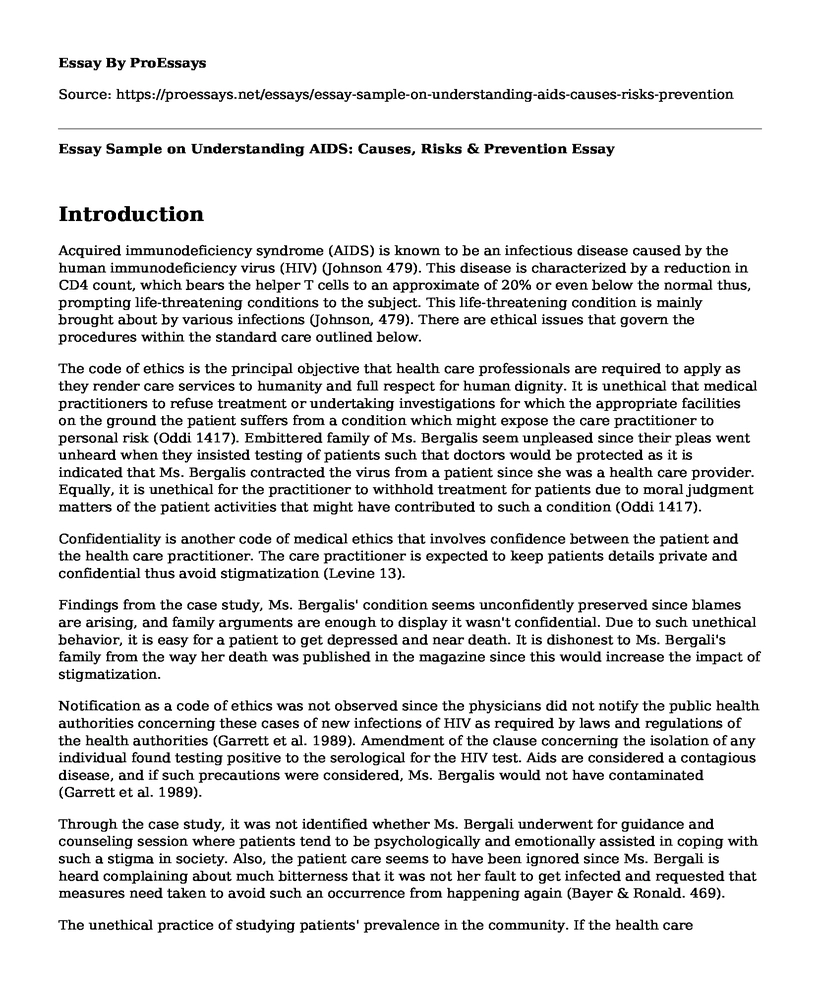Introduction
Acquired immunodeficiency syndrome (AIDS) is known to be an infectious disease caused by the human immunodeficiency virus (HIV) (Johnson 479). This disease is characterized by a reduction in CD4 count, which bears the helper T cells to an approximate of 20% or even below the normal thus, prompting life-threatening conditions to the subject. This life-threatening condition is mainly brought about by various infections (Johnson, 479). There are ethical issues that govern the procedures within the standard care outlined below.
The code of ethics is the principal objective that health care professionals are required to apply as they render care services to humanity and full respect for human dignity. It is unethical that medical practitioners to refuse treatment or undertaking investigations for which the appropriate facilities on the ground the patient suffers from a condition which might expose the care practitioner to personal risk (Oddi 1417). Embittered family of Ms. Bergalis seem unpleased since their pleas went unheard when they insisted testing of patients such that doctors would be protected as it is indicated that Ms. Bergalis contracted the virus from a patient since she was a health care provider. Equally, it is unethical for the practitioner to withhold treatment for patients due to moral judgment matters of the patient activities that might have contributed to such a condition (Oddi 1417).
Confidentiality is another code of medical ethics that involves confidence between the patient and the health care practitioner. The care practitioner is expected to keep patients details private and confidential thus avoid stigmatization (Levine 13).
Findings from the case study, Ms. Bergalis' condition seems unconfidently preserved since blames are arising, and family arguments are enough to display it wasn't confidential. Due to such unethical behavior, it is easy for a patient to get depressed and near death. It is dishonest to Ms. Bergali's family from the way her death was published in the magazine since this would increase the impact of stigmatization.
Notification as a code of ethics was not observed since the physicians did not notify the public health authorities concerning these cases of new infections of HIV as required by laws and regulations of the health authorities (Garrett et al. 1989). Amendment of the clause concerning the isolation of any individual found testing positive to the serological for the HIV test. Aids are considered a contagious disease, and if such precautions were considered, Ms. Bergalis would not have contaminated (Garrett et al. 1989).
Through the case study, it was not identified whether Ms. Bergali underwent for guidance and counseling session where patients tend to be psychologically and emotionally assisted in coping with such a stigma in society. Also, the patient care seems to have been ignored since Ms. Bergali is heard complaining about much bitterness that it was not her fault to get infected and requested that measures need taken to avoid such an occurrence from happening again (Bayer & Ronald. 469).
The unethical practice of studying patients' prevalence in the community. If the health care management had had proper recording details with the trends of new infections, more precaution and care would be applied to prevent contamination of the disease through. Research ethics were violated since the subjects were exposed to the risk of taking part in the research, thus interfering with results due to bias hence unfit for generalization of the findings (Bayer & Ronald. 469).
Works Cited
Bayer, Ronald. "Stigma and the ethics of public health: not can we but should we." Social science & medicine 67.3 (2008): 463-472.
Garrett, Thomas M., et al. Health care ethics: Principles and problems. Englewood Cliffs, NJ: Prentice-Hall, 1989.
Johnson, Mark D. "HIV Testing of Health Care Workers: Conflict Between the Common Law and the Centers for Disease Control." Am. UL Rev. 42 (1992): 479.
Levine, Carol, Nancy Neveloff Dubler, and Robert J. Levine. "Building a new consensus: ethical principles and policies for clinical research on HIV/AIDS." IRB: Ethics & Human Research 13.1/2 (1991): 1-17.
Oddi, A. Samuel. "Reverse informed consent: the unreasonably dangerous patient." Vand. L. Rev. 46 (1993): 1417.
Cite this page
Essay Sample on Understanding AIDS: Causes, Risks & Prevention. (2023, Apr 08). Retrieved from https://proessays.net/essays/essay-sample-on-understanding-aids-causes-risks-prevention
If you are the original author of this essay and no longer wish to have it published on the ProEssays website, please click below to request its removal:
- Tai Chi Therapy Incorporated in Activities of Daily Living in the Elderly to Improve Quality of Life
- Argumentative Essay Sample on Abortion
- Fetal Alcohol Syndrome: The Risks of Drinking During Pregnancy - Essay Sample
- Essay Sample on Unlocking Freedom: How Mobile Technology Is Changing Lives of Disabled Individuals
- Vaccination in UK - Research Paper
- My Closest Friend's Horrific Accident: A Survivor's Tale - Essay Sample
- Assessing Nutritional Status: A Major Issue - Essay Sample







